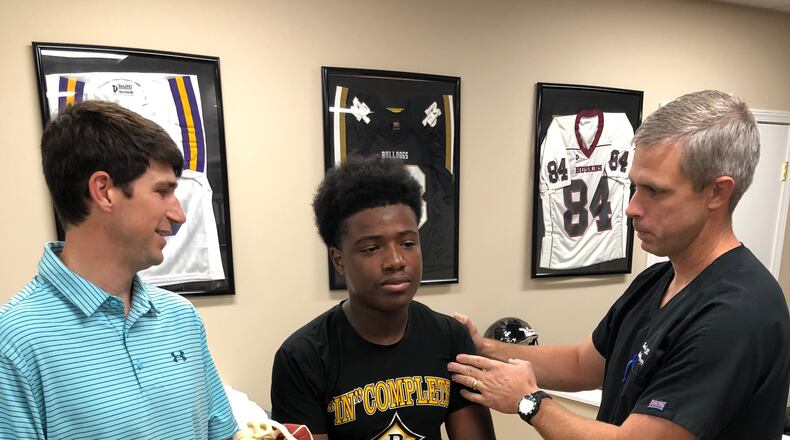Orthopedic clinics throughout the state of Georgia are doing their part to ease the financial and physical pain for high school football players who are injured during Friday night play.
Some clinics are new to the game. Others, including Piedmont Orthopedic Complex in Macon, have been taking care of athletes at its Saturday morning clinics for almost 30 years.
In most cases, these clinics are free, eliminating time-consuming visits and financial burdens of trips to local emergency rooms. It helps ease the strain for athletes, parents and coaches.
"It's a win-win situation," said James Crownover, MD, a sports medicine physician for Augusta University Orthopedics, where they've hosted a Saturday morning clinic during football season for the past several years. "It's a good opportunity to provide service for an athlete to get quick, quality care, and it's an opportunity for the practice to get involved in the community in a meaningful way."
Typically, a given Saturday morning clinic can provide numerous services, including diagnosis of injury, X-rays, casting, bracing, crutches, treatment for pain and possible MRIs. At Piedmont Orthopedic Complex in Macon, the only cost for the injured player during a Saturday morning visit is for crutches or braces. A trip to urgent care or the ER could run anywhere between $100-$700 or more, according to Debt.org.
Piedmont orthopedic surgeon Dr. Dan Grahl has seen all sides of the Saturday morning clinic experience, having also been a two-sport athlete (football, baseball) and a coach for Peach County.
"I broke my leg playing college baseball (at Georgia Southwestern State in Americus) and was able to come back and play thanks to (Piedmont orthopedist Dr. Bill Barnes)," Grahl said. "That's what drove me to become an orthopedist."
Grahl said Piedmont is open to all athletes in the area. Most Saturday morning clinics will see any injured athlete, regardless of where they play. In a lot of cases the clinic has an athletic trainer assigned to games throughout the coverage area, employed by the clinic. When an injury occurs during the game, communication with the orthopedist begins immediately.
"We're given a heads up, and if I'm the one who's scheduled to work that Saturday, one of the trainers will let me know what's going on (with a player)," Crownover said.
Dr. Kevin Collins, an orthopedic physician who runs a Saturday morning clinic at The Hughston Clinic in Moultrie, said the main benefit to the service is peace of mind.
"For the athlete who puts in a lot of work, especially with football preparation beginning in January, they have the peace of mind of knowing what the injury is and what they need to do to get better and get back to playing," Collins said. "Secondly, for the parents, they're worried. It's a violent sport, and with head injuries and concussions that could be more severe than what we knew about 20 years ago, they're worried more about what it's going to be like for (their kid) down the road. The other side to it is the coaches. They're already developing a game plan on Sunday for the next week, so they want to know if they can count on this guy, or if it's a next-man-up situation.
"With a diagnosis on Saturday, it gives everyone a plan to rally around."
About the Author
The Latest
Featured

